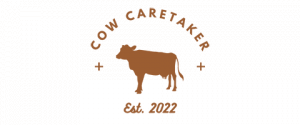There is no clearly defined reason why cows eat their placentas. It could be due to bonding, to avoid predators from gaining a scent from the calf, hunger and nutrition, or simply as a result of natural instincts.
The act of a mammal eating placenta isn’t really new—most mammals are known to eat their placenta shortly after birth, apart from camelids, aquatic mammals, and humans (yes, some of us do!).
While the habit of eating the placenta isn’t necessarily dangerous, you are right to worry (and not to) about your cow eating her placenta.
Does the placenta harm the cow when ingested? And should you let your cow eat it? Let’s separate the facts from the myths!
Table of Contents
Do Cows Really Eat Their Placenta?
Yes, cows do eat their afterbirth. It’s normal and essentially healthy for the cow. However, it’s not a universal trait as not all cows or mammals need to eat their maternal placenta.
The habit of eating all or part of the placenta, as exhibited by most placental mammals, is called placentophagia. Since not all cows eat their afterbirth, the practice manifests in bovines as inconsistent placentophagia.
The incidence of the practice is also more common in dairy cows than beef cattle.
Why Do Cows Eat Their Placenta?
There is hardly enough evidence why cows (or other placental animals) eat their own placenta after giving birth.
Research into placentophagia isn’t abundant, especially in nonhuman mammals. However, some has been done into human placentophagy because the practice has been gaining popularity since the 1970s.
Human placentophagy has been around for a long time. But there are scarcely any cultures known to inherently practice it. The practice has been practiced in places like China since the ages as part of “medication” for managing postpartum depression in new mothers.
Some people now dive deep into placenta encapsulation, where the human placenta is processed and packed into capsules for consumption by the mother or father of the child.
Do humans eat cow placenta? Placenta encapsulation isn’t only practiced with the human placenta. Some people also have the afterbirth of their cows encapsulated for personal consumption or sale.
But I fear this article is more about cows eating placenta than us humans doing so…
As mentioned, there’s no hard evidence why a cow eats her placenta after parturition. The only information we have around the subject is centered mainly on four theories, some of which are more believable.
Let’s take a quick look at the four theories.
1. Cows Eat Their Placenta For Bonding
The theory that a cow eats her placenta to bond with the newborn calf is easily dismissible, especially in commercial dairying and homestead cattle farming.
When a cow gives birth, the calf is often taken away shortly after the cow has licked all the amniotic fluid on the calf’s body. This, together with the bonding between a mother and her fetus, is enough to start with.
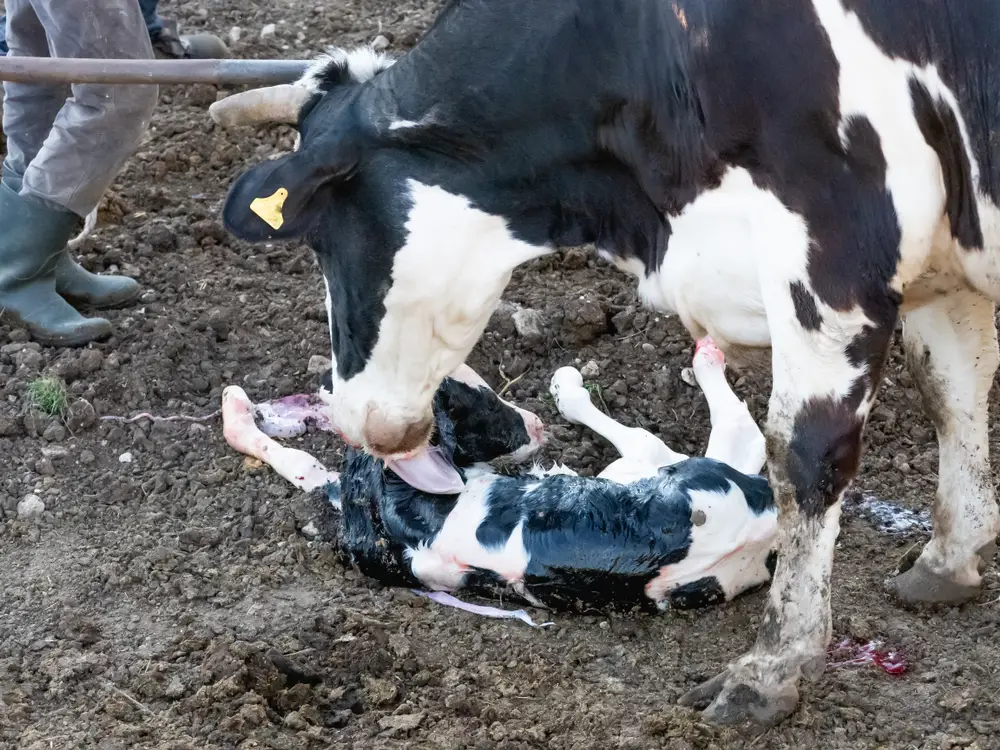
Since the afterbirth is dropped or delivered several minutes to hours in the postpartum period, eating the placenta won’t be too much help with bonding between the calf and the dam.
2. Cows Eat Their Afterbirth As A Predator Avoidance Tactic
One of the more plausible theories on bovine placentophagy is that a cow will eat her placenta to remove the smell of blood that may attract predators like coyotes, dogs, eagles, or wolves to her vulnerable young one.
The risk of predators feasting on a cow’s placenta is more prevalent on free-range farms than homestead farms. Nevertheless, a cow won’t take chances.
The theory gains more weight because predatory behavior on the placenta has been observed in animals like dogs.
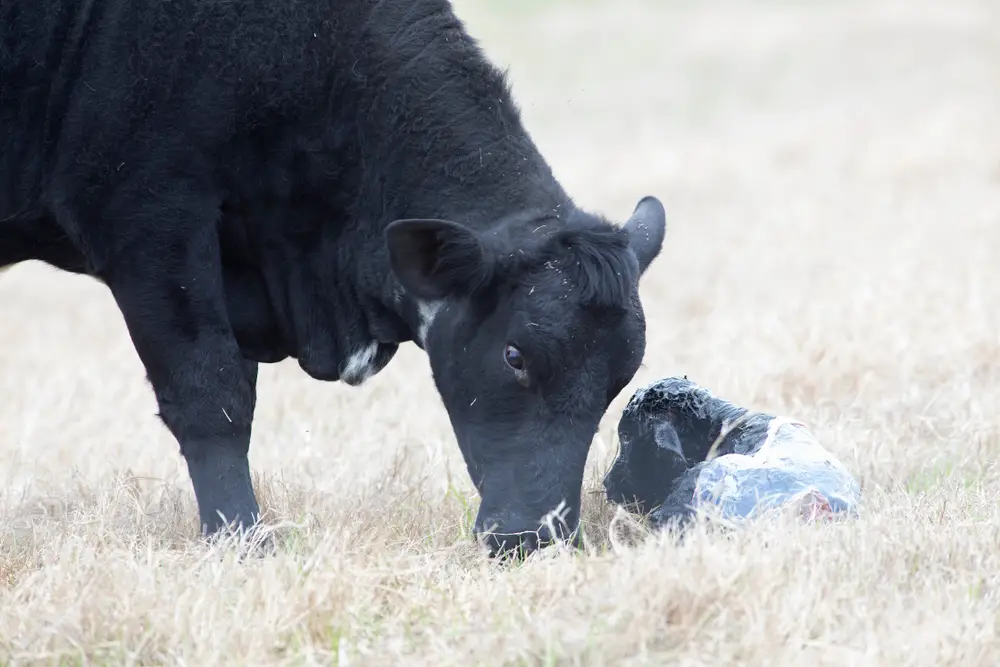
In my area, when a cow gives birth during the day or night, there has to be someone around her every second to ward off dogs looking to eat the placenta.
I’ve even seen farmers whose cows had retained placenta and were eaten by dogs (the afterbirth and the vulva) because they despaired and left the cow unmanned before the placenta was delivered.
3. Cows Eat Their Afterbirth Because Of Hunger
Another quite plausible bovine placentophagy theory is that a cow will eat her placenta because she is hungry. This is split into two forms—general hunger and specific hunger.
General hunger means that the cow is hungry because the parturition process is physically demanding, so she eats the afterbirth to reduce the hunger.
Specific hunger points to the cow’s craving for specific nutrients in the placenta, with which it can replenish those depleted in pregnancy sustenance and parturition.
The placenta is known to contain nutrients, minerals, vitamins, and hormones. It is rich in calcium, iron, oxytocin, and prostaglandin. The concentrations of these vitals in the placenta will differ from cow to cow, and so will its overall nutritional value.
4. Cows Eat Their Afterbirth Out Of Natural Instinct
Since cows evolved over thousands of years in the wild, they have developed several naturally instinctive behaviors, including eating their placenta.
We may be here trying to find out if it’s safe for cows to eat their afterbirth, but our bovine friends have probably found the answer—it’s safe and sane. Otherwise, they wouldn’t eat it! But then again, that doesn’t explain why some eat it and others don’t!
When Do Cows Eat Their Afterbirth?
The time when a cow eats her placenta depends on how long it takes her to drop it. Normal delivery of the placenta happens anywhere from a few minutes after birth to between 6 and 8 hours.
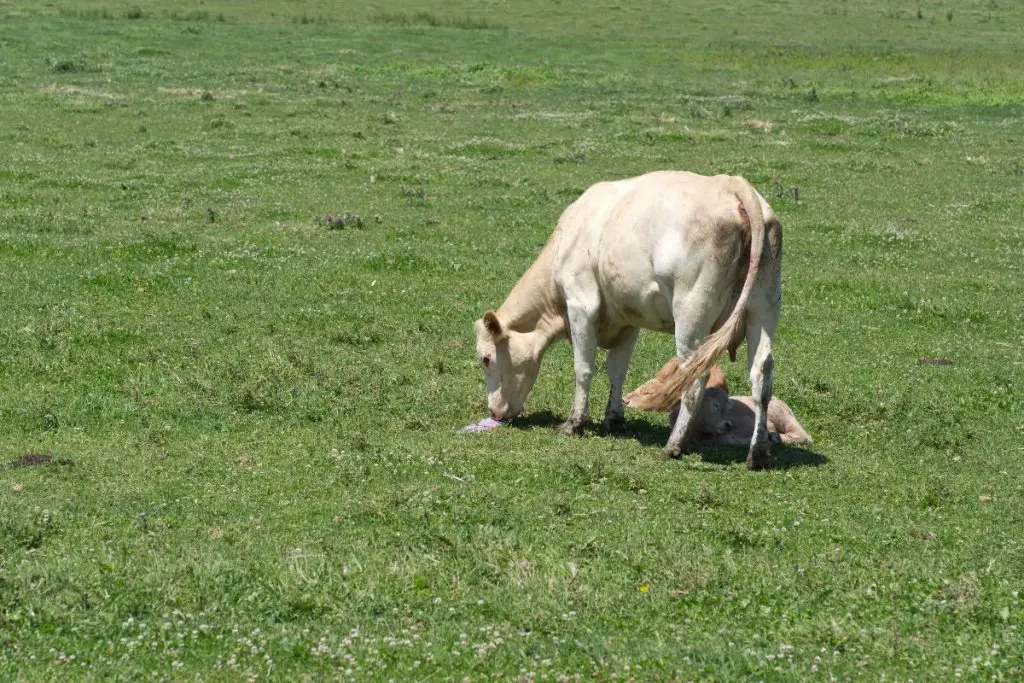
The duration may be longer, for example, in a heifer that’s calving down for the first time. It could be as much as 12 hours. If the duration exceeds 12 hours, the cow most likely has retained fetal membranes, and a vet should examine her closely.
When the cow is too tempted by the placenta’s smell or the craving for specific nutrients, she tries to eat it before it hits the ground. She contorts her body until she is able to reach it.
What Happens If A Cow Eats Its Afterbirth?
There are both negative and positive effects of placentophagia. However, research into this is also scarce.
Possible Negative Effects of Bovine Placentophagia
The following side effects may stem from placentophagia in cows:
- Choking to death on the slippery afterbirth.
- Risk of ingesting toxins and contaminants the placenta may have filtered during pregnancy. (The umbilical cord acts as the conduit for the passage of filtered toxins and other materials between the fetus and its mother.)
- Risk of infections if the placenta is contaminated in the birth area by bacteria, viruses, or cow poop.
- Temporary indigestion problems or food poisoning if the afterbirth was retained for long or got contaminated.
- Abnormal manure for about 24 hours after afterbirth ingestion.
Possible Positive Effects of Bovine Placentophagia
If a cow eats her own placenta, she may enjoy benefits such as:
- The uterus returning to normal pre-pregnancy size faster because of the consumption of prostaglandin hormone
- Increased milk yield because of consuming oxytocin hormone
- Uterine pain relief (some researchers believe the amniotic fluid and afterbirth contain adorphine, which helps relieve pain in the uterus)
- Negating left displaced abomasum caused by hypocalcemia (the placenta is laden with calcium, and since cows are herbivores, the ingested placenta is disgested and released slowly. During this time, it sits in place and prevents the abomasum from getting displaced.)
- Increased feed intake
A study investigating the effect of bovine placental lactogen on feed intake and milk yield found that in-lactation cows injected with higher doses of the lactogen had an increase in dry matter intake and milk production.
(Bovine placental lactogen is a hormone produced during pregnancy and is present in the afterbirth.)
Going by this study, we can safely dispel the myth that milk production lowers in dairy cows when they eat their placenta. This myth is common in many parts of Africa, where farmers do their best to remove the afterbirth before the cow grabs it.
How Do You Treat A Cow That Has Eaten Its Placenta?
Under normal conditions of sanitary calving and afterbirth delivery, you won’t have to treat your cow if she eats the placenta.
Treatment may be needed if the ingested afterbirth was contaminated and causes extreme digestion problems, which sometimes lead to death.
If you notice the cow choking on the placenta, your quick intervention will be required to save it by helping her cough it out.
What you need to worry about is managing dystocia, which often causes placenta retention. You can avoid the retention by supplementing the cow with vitamin E and selenium.
Should I Let The Cow Eat The Afterbirth?
There’s no one single way to answer this question definitively.
The decision to let your cow eat her afterbirth or not rests solely with you, depending on your conviction and past experiences.
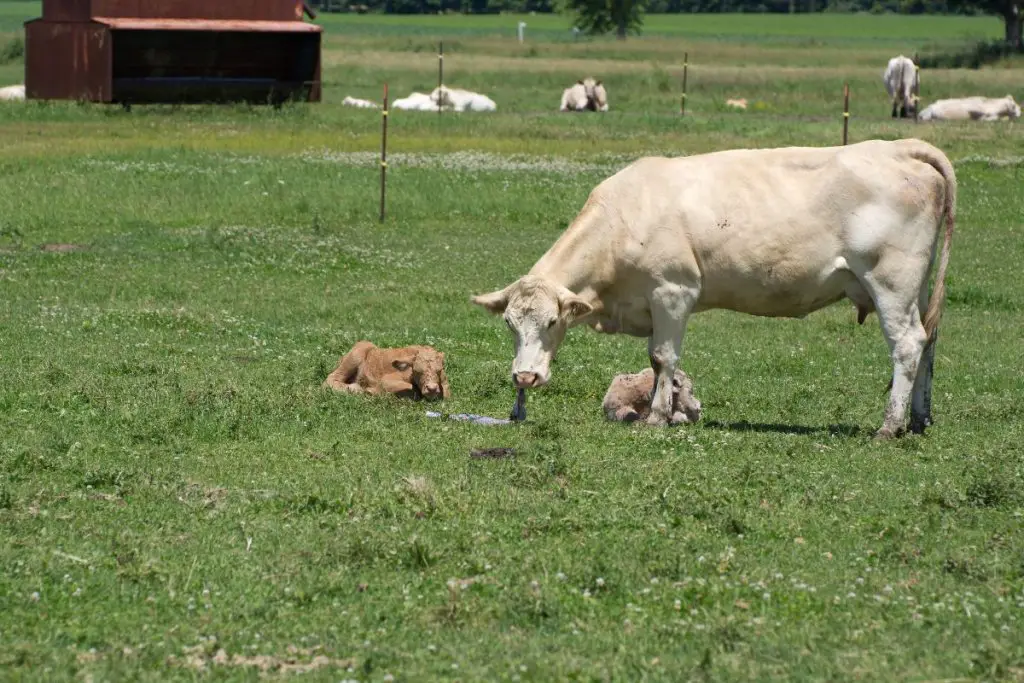
If you have seen cows eat placenta and good came out of the act, you can let yours eat hers.
If you’ve seen cows eat their afterbirth and it had adverse effects on them, you might want to ensure your cow doesn’t eat hers.
The afterbirth has ugly names in most African languages, which is why it’s taboo to mention it other than during parturition. Most farmers don’t even want children to see it, and they dispose of it faster than the cow cares to turn and see it.
An excellent way to decide quickly is to trust the cow’s instincts. Since cows carefully select what to eat, you can bet it’s safe if she chooses to eat her own placenta.
What Should I Do If I Don’t Want My Cow To Eat Her Placenta?
If you don’t want your cow to eat her afterbirth, you have a few options:
- Take away the afterbirth immediately after it’s dropped and feed it to dogs. (Some people do this, while others don’t, out of fear that this might spur dogs to prey on calves or eat the unhealed cow’s vulva at night).
- Dispose of the afterbirth by burning or burying it in manure to keep away predators, promote cleanliness in the calving area, and eliminate the chances of the cow choking on it. (Most of the time, when you bury the placenta in the soil, dogs can still smell and dig it up).
- Give the cow some food to draw her attention away from the placenta. In my place, we offer the cow some dry corn (2-4 pounds, depending on her size). The corn helps her drop the afterbirth faster, at least we believe so!
